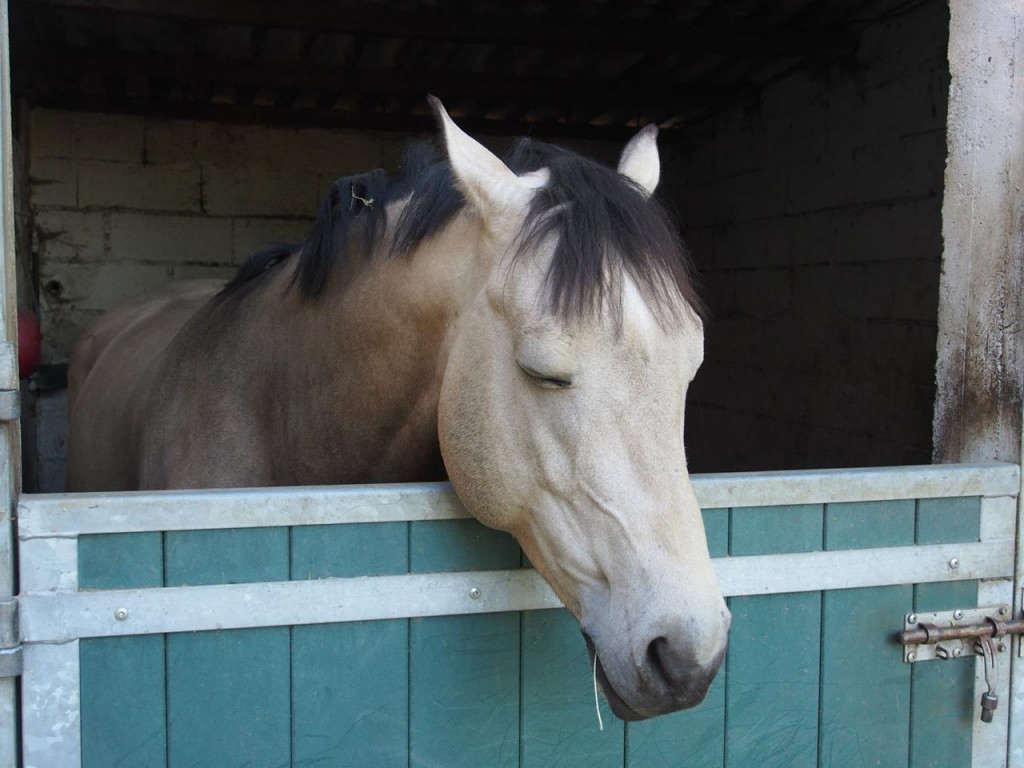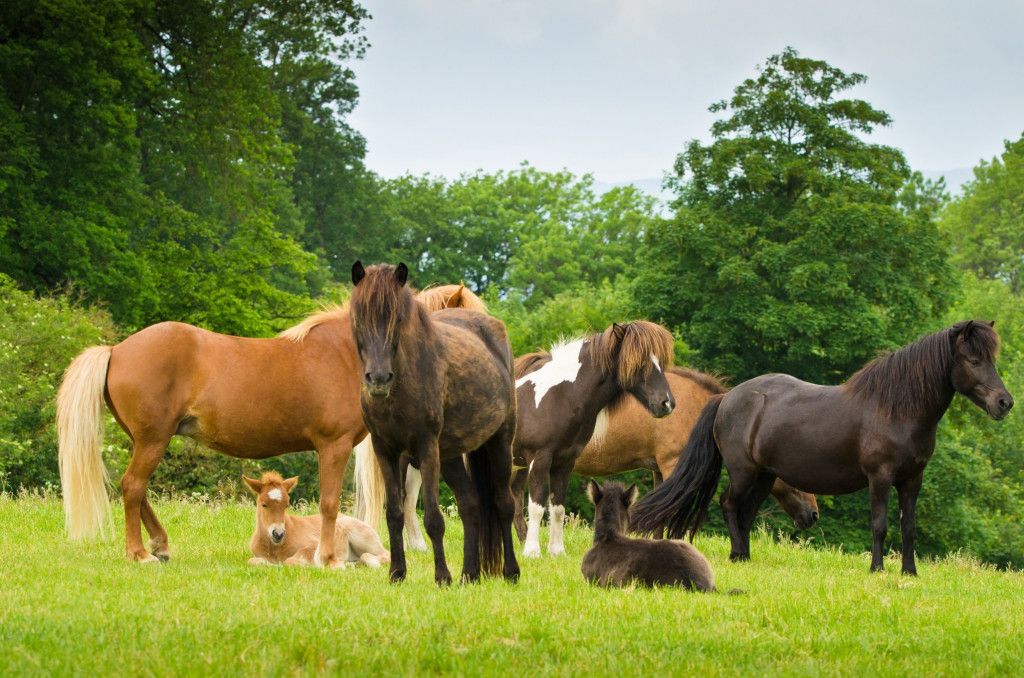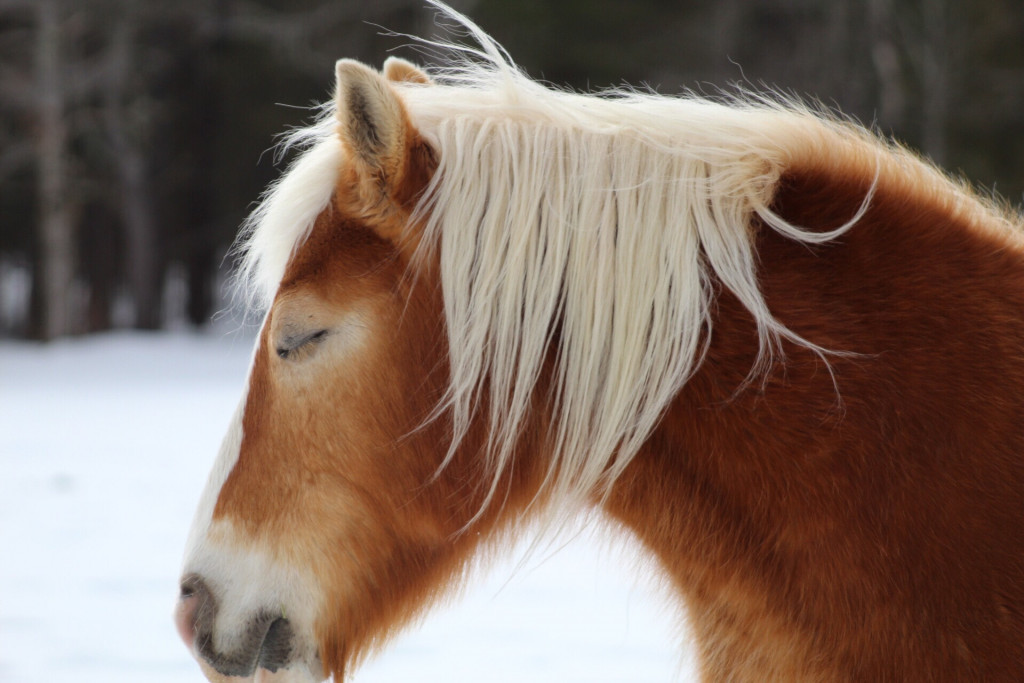Table of Contents (click to expand)
Horses are part of a small group of animals that are able to sleep standing up. They do this so they can run away from danger, such as a predator attack, at a moment’s notice. However, horses can sleep lying down too!
Horses are majestic creatures. If you’re lucky enough to have the time, the resources, and the opportunity to watch a horse for a day or two, you may notice that, in the middle of the day, while the sun is shining bright outside, the horse may doze off… while standing up straight. Eyes shut, head bowed down slightly. The horse seems to have escaped to horse dreamland. After several minutes, it opens its eyes and appears to rejoin reality.
This behavior has intrigued those who breed horses, as well as researchers who study sleep. Why do horse sleep while standing up straight and how do they manage to do so without falling over?

How Do Horses Sleep
Horses do sleep standing up, but that isn’t the whole story. There are, to put it broadly, two types of sleep: slow wave sleep (SWS) and REM sleep (also sometimes called paradoxical sleep).
Horses, just like many other mammals, lay down and curl up for a good deep sleep when they need it. This is most commonly observed at night time, when it’s dark and the temperature is cooler. This is the deeper REM sleep. The horse’s muscles relax and brain waves shift in order to give the horse a complete rest. This sleep can last for about 2 to 3 hours, or as short as a few minutes, depending on the horse and its surroundings.

Slow wave sleep, as the name suggests, is when the brain waves are slow (and regular). Though the name has slow in it, it is actually a shallow form of sleep, akin to dozing off for a brief time. The horses may be napping to complete their required quota of sleep. Just as humans are recommended to have 6 to 8 hours of sleep per day, horses need about 2 to 5 hours per day.
Horses take their slow wave sleep not as lengthy siestas, but rather like an overworked employee in a corporate job with impeding deadlines and a mountain of student debt—in short bursts in the middle of the day. This is when the horse’s unique standing behavior comes into play.
Horses take their mid-day naps standing up!
Also Read: Why Do We Sleep Less Than Our Primate Relatives?
Why Horses Sleep Standing Up
In the wild, horses in are in danger of some predators. Laying down and sleeping, even if it’s only slow wave sleep, would increase the risk of getting caught by those predators. Even a split second is enough to change the odds between life and death. Taking a snooze while standing allows a horse to rest, while also being able to escape peril swiftly.

Horses in herds don’t all sleep at the same time. One or two remain awake, on the lookout for potential predators or other signs of danger; constant vigilance is the name of the game.
In a stable, there isn’t much danger of a carnivore, but the behavior has persisted.
Also Read: Why Don’t Birds Fall Off Branches When They Sleep?
How Horses Sleep Standing Up
When sleep overtakes the senses, the muscles relax and one becomes limp. Standing up requires active effort from the muscles throughout the body, not only those of your legs to support you, but also muscles in the rest of the body to keep you balanced so that you don’t fall over.
Stay Apparatus Of Horse
However, the horse’s body has a feature that helps it sleep as it stands with minimal effort: the stay apparatus.
The stay apparatus is a group of muscles, tendons, and ligaments in the hind legs of the horse that allow it to keep standing without continual effort.
When horses begin to doze off, they initiate the stay apparatus by bending one of their legs, say a hind leg, at the knee and “locking” it. The other three legs carry the weight of the horse as it snoozes. After some time, the horse will shift its weight on another leg to prevent fatigue.
Do Other Animals Sleep Standing Up?
Horses aren’t the only animals that have short sleep durations and a vertical sleep position. They are part of a small group of animals that can sleep standing up. Other mammals, such as giraffes, elephants and camels have a similar stay apparatus that allows them to sleep while standing. Many birds sleep straight up—and even on one leg! The most popular example is the flamingo, but many other birds use a unique perching mechanism to sleep on branches without falling off.
A Final Word
Researchers study such unique sleeping patterns to get a deeper insight into the purpose of sleep. Though we know much about the effects of sleep on the body (through what happens when one is sleep deprived), fundamental questions about why and how sleeping evolved remain to be answered!
How well do you understand the article above!

References (click to expand)
- Schuurman, S. O., Kersten, W., & Weijs, W. A. (2003, April). The equine hind limb is actively stabilized during standing. Journal of Anatomy. Wiley.
- Chung, E. L. T., Khairuddin, N. H., Azizan, T. R. P. T., & Adamu, L. (2018, July). Sleeping patterns of horses in selected local horse stables in Malaysia. Journal of Veterinary Behavior. Elsevier BV.
- (1990) Sleep patterns in the horse - Agris (FAO). The Food and Agriculture Organization of the United Nations
